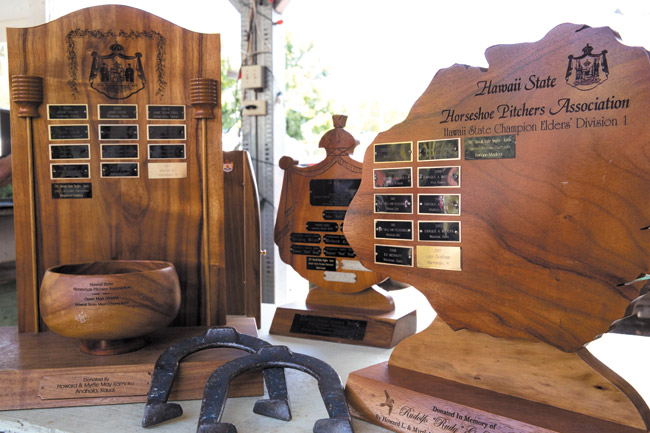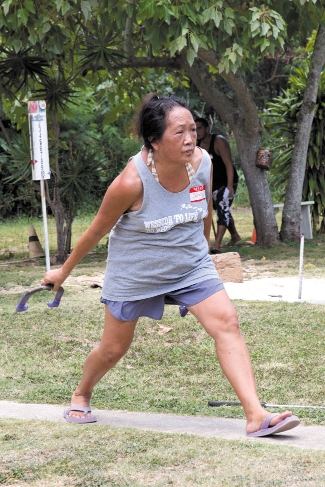Throwing Iron
The state horseshoes tournament is a reminder of the beauty of a game that promotes friendship
In most sports, the sound of hitting iron has a negative connotation.
Whether it’s the bonk of a football off an upright, the clang of a puck off the goal post or the thud of a basketball hitting the rim, they all mean failure to the participant.
Then there’s horseshoes, where the ting of metal-on-metal is the sound of victory. Listening to a meet is akin to hearing the transcontinental railroad being built in the 1860s as the air is filled with the constant clink of cast iron hitting cast iron.
Over Labor Day weekend, the Hawaii State Horseshoe Pitchers Association (HSHPA) held its 25th annual state tournament in Waimanalo, featuring 58 pitchers from Oahu, Kauai and Hawaii Island to duel for the title of state champ and the right to take home the koa trophy for the year.
Participants have a little different vibe than at your average championship event. They all have their game faces on as in any other sport, but these game faces look more like yours would at a family reunion than at a winner-take-all event. Everyone is full of smiles – there is some heckling, but it is usually of the self-deprecating variety.
“Yeah, I won ’em last year, but only ’cause the other guys didn’t show up,” says Kingston Lindsey with a laugh. His competitors call him Colonel Klink, because that is all you hear when he plays, the clink clink clink of ringers.
Last year was his first state championship after a decade of dedicated play, and he credits his wife with engaging him in the sport after he retired.
“My wife got me into it,” Lindsey says with a purposeful pause before finishing with a roar of laughter, “’cause she says I got to get out of the house!
“It is cheaper than most sports and it keeps you focused. I get down here a couple times a week to play. It is way cheaper than fishing – no boats, no rods, no bait.”
It is the frugalness of the game that attracted this year’s champion Melvin Eli to the sport in 2011. He is a former junior state bowling champion, but the cost of rolling the lanes got to him after awhile.
“It is way cheaper than bowling. Before I was paying $150 a week to bowl,” says Eli, who is now a two-time champion, having taken home the trophy in his rookie season two years ago. “For horseshoes you pay $20 a week, you enjoy everybody’s company, you have fun, nobody gets out of hand and the trophy looks good at home!”
It is this affordability and portability that make this sport so attractive. There are more than 15 million pitchers in the U.S., and all one needs to play are two iron stakes, 40 feet of space and enough shoes to outfit one horse.
“Its a sport that doesn’t cost you anything once you buy your shoes, unless you are playing in a tournament,” says Carol Costa, vice president of the HSHPA Hilo branch. “Take your shoes down to the courts anytime and pitch; it’s not like if you go golfing or you go bowling. Every time you do those, you have to pay.”
The sport dates back to the Roman Empire when legions were scattered across the European continent and soldiers used to “pitch iron” to fill the hours and distract them from their homesickness.
In the Islands, you can see people pitching at beach parks every weekend, but for formal play (as formal as a sport played in slippers with a beverage in one hand can be) there are three locations on Oahu: Kalaeloa, Waianae and Waimanalo. Also, you can find pits in Anahola on Kauai and two on Hawaii Island – in Kailua-Kona and in Onekahakaha Beach Park in Hilo.
Club dues are just $25 a year to play the pits as much as you like, and tournaments cost $20, with most of the entry fees going back to the players in the form of prize money.
But the funds are never the focus. “It is not about the money; we work first, but we love the sport,” says Eli, who works for Aloha International Moving Services when he isn’t dominating the pits.
The group is split up into eight different classes based on your “ringer percentage” – how many times your shoe encircles the peg out of 100 pitches. The lowest competing that weekend was 4.8 percent, with the top-level pitchers like Eli and Lindsey averaging more than 50 percent.
Regardless of their skill level, the camaraderie that develops among them is infectious. And while it is the horseshoes that drew them together, it is the company that makes them stay.
“We love it, we have such a bunch of nice people,” says Costa, who is a retired adult education teacher from Kailua. “We pitch every Sunday at Onekahakaha Beach Park, we have lunch, we pitch, have a few drinks and play music and then close down the park before they lock us in!”
Another champion has been crowned, and even though there can only be one winner, the true success of the game is held up by the relationships they have built.
“There is no animosity, nobody get grumble with nobody, you win, you win. You lose, you lose. Next game,” says Eli with a horseshoe-size grin on his face. “We better than friends, we family.”







